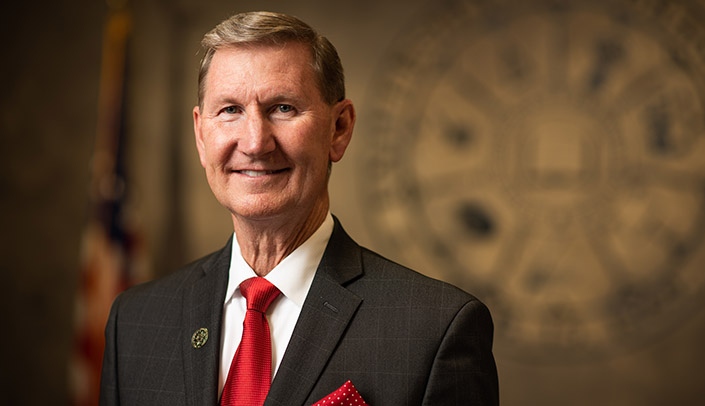University of Nebraska President Ted Carter told the Board of Regents Friday that he has begun a strategic planning process that will articulate ambitious goals for growth and value over the next five years.
Carter, who became president of the NU system on Jan. 1, said he has convened a university-wide team of students, faculty and staff to help guide the development of the strategic plan. Following review by the chancellors and other executive leadership, the plan will be released by April 17, when Carter will be formally installed as NU’s eighth president.
The 28-member team met for the first time in early February and has begun examining broad themes including the role and mission of the NU system, enrollment, research and partnerships, diversity and inclusion, and budget and finance.
Their charge, Carter said, is to help chart a path forward as the university seeks to enhance student success, expand the affordability and accessibility of higher education, meet workforce needs and address challenges like hunger, disease and national security. The plan will supplement campus strategic plans already underway.
In thanking colleagues for agreeing to serve, Carter said: “We’re going to think differently and creatively about what the future state of the university should be. I think you’re going to see some bold ideas about how we can grow our impact on our students, our state and the world.”
Resources will be directed toward what matters most, Carter added: The success and well-being of NU’s 51,000 students. “Everything we do is going to be about our students.”
While priorities will evolve, Carter’s initial goals, based on his first month of campus visits and engagement with university stakeholders, include:
- Growing enrollment, particularly out-of-state enrollment, to create “brain gain” in Nebraska. He praised aggressive growth goals in UNL’s College of Engineering as “the kind of big thinking we need” to address the state’s workforce shortages.
Carter also highlighted UNMC nursing and allied health programs on the UNK campus in order to meet health care needs in rural Nebraska, UNK’s soon-to-open STEM education building, and growth in UNO’s College of Information Science & Technology. A new scholarship program proposed by Gov. Pete Ricketts to steer students to high-need, high-paying careers in Nebraska also would help grow the state’s talent base, Carter said.
- Improving retention and graduation rates, including doing more to educate students on the benefits of four-year graduation. Enhanced student outcomes will mean greater investment in and access to mental health services, Carter added.
He also highlighted the 288,000 Nebraskans who have completed some college but have not earned a degree, saying the university has an opportunity to help those Nebraskans complete their studies through its online programs or enhanced transferability with partners in the state and community college systems.
- Improving diversity and inclusion, both among the student body and faculty and staff ranks. Carter noted that students expect and deserve to see themselves reflected in classroom and administrative leadership.
- Elevating the impact and reputation of NU’s research enterprise, particularly in areas where the campuses already are or can be national and international leaders, including agriculture and water, cancer, infectious disease, national security, early childhood education, biomechanics and others.
Equally important, Carter said, is outreach and community engagement, including the work of Nebraska Extension that touches all 93 Nebraska counties.
- Addressing peer gaps in faculty salaries at UNL and UNMC so the university can compete for and retain top talent.
- Improving sustainability and reducing energy usage and costs across the system – already high priorities on all campuses.
- Continuing efforts to become more efficient and effective, reducing pressure on tuition and allowing for the greatest possible investment in the academic enterprise.
Carter praised recent work in streamlining operations across the NU system; a newly approved network purchase to serve IT needs across campuses, for example, will cost an estimated $15 million less over the next few years than if each campus had negotiated on its own.
“The opportunities and challenges facing the university, our state, nation and world are great,” Carter told NU regents. “I look forward to bringing back to you our five-year strategy which will serve as a roadmap to take the University of Nebraska to even greater heights for the benefit of our students, employees and all Nebraskans.”
